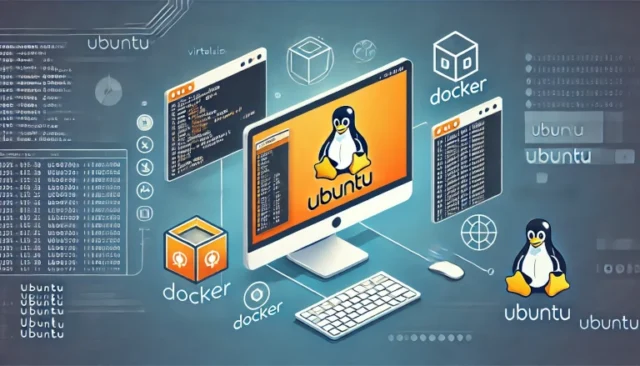Docker is a versatile platform that allows you to run applications in isolated environments called containers. Running Ubuntu in a Docker container is particularly helpful for developers who need a quick and portable Linux environment without the overhead of a virtual machine. In this comprehensive guide, we will cover everything you need to know about running Ubuntu in Docker, including what Docker is, how to set it up, and how to troubleshoot common issues that may arise.
Whether you’re new to Docker or experienced with containerized applications, this guide will help you confidently run Ubuntu inside a Docker container.
What is Docker and How Does It Work?
Docker is an open-source platform that allows developers to create, deploy, and run applications in containers. Containers are lightweight and portable, making it easy to develop, test, and deploy software consistently across different environments.
- Containers vs. Virtual Machines: Unlike virtual machines, containers share the host operating system kernel, making them more efficient in terms of resource usage. This makes Docker an ideal solution for quickly running different operating systems, such as Ubuntu, with minimal setup.
- Docker Images and Containers: A Docker image is a blueprint for creating containers. When you run an image, it becomes a container. In this case, we use the Ubuntu image to run Ubuntu in a container.
Setting Up Docker
Before you can run Ubuntu in a Docker container, you need to install Docker. Below is a step-by-step guide on setting up Docker and running Ubuntu.
Step 1: Install Docker on Your System
To use Docker, you first need to install it on your system. Follow these steps:
- Update your system:
sudo apt update && sudo apt upgrade -y- Install Docker:
sudo apt install docker.io -y- Start and enable Docker service:
sudo systemctl start docker
sudo systemctl enable docker- Verify Docker installation:
docker --versionThese commands will install Docker and ensure that it is running properly on your system.
How to Run Ubuntu in a Docker Container
Once Docker is installed, you can run Ubuntu using a Docker container. Here are the steps to get started:
Step 2: Pull the Ubuntu Image
The first step in running Ubuntu in Docker is to pull the Ubuntu image from Docker Hub. Docker Hub is a repository where Docker images are stored and shared.
Run the following command to pull the latest Ubuntu image:
docker pull ubuntu:latestThis command will download the Ubuntu image to your system. You can also specify a version if needed, for example, ubuntu:20.04 for Ubuntu 20.04.
Step 3: Run the Ubuntu Container
Once the image is downloaded, you can create a container from it by running the following command:
docker run -it ubuntu-it: These flags allow you to interact with the container using an interactive terminal.ubuntu: This is the name of the image you want to use.
This command will give you a shell prompt inside the Ubuntu container, and you can start using Ubuntu just like you would on a regular system.
Common Docker Commands for Ubuntu Container
Here are some common Docker commands that will help you manage your Ubuntu container more effectively:
- List Running Containers:
docker psThis command lists all running containers, providing information like container ID, name, and status.
- Stop a Container:
docker stop <container_id>Use this command to stop a running container. Replace <container_id> with the actual container ID.
- Remove a Container:
docker rm <container_id>To remove a container after stopping it, use this command.
- Run Ubuntu with a Custom Command:
docker run ubuntu echo "Hello from Ubuntu!"This runs the Ubuntu container and immediately executes the echo command.
Understanding Docker Volumes and Persistent Data
By default, any data you create inside a Docker container is temporary and will be lost when the container stops. If you want to keep your data, you need to use Docker volumes.
To create a volume and use it with an Ubuntu container, run:
docker run -it -v myvolume:/data ubuntu-v myvolume:/data: This option mounts a volume namedmyvolumeto the/datadirectory inside the container.
Docker volumes are useful for storing persistent data that you don’t want to lose when the container stops or restarts.
Troubleshooting Common Issues
Here are some common issues you may encounter when running Ubuntu in Docker, along with solutions to help you troubleshoot them:
Issue 1: Docker Daemon Not Running
If you see an error like Cannot connect to the Docker daemon, the Docker service may not be running.
Solution: Start the Docker service using:
sudo systemctl start dockerIssue 2: Permission Denied
If you encounter permission denied errors while running Docker commands, it could be due to insufficient permissions.
Solution: Add your user to the Docker group:
sudo usermod -aG docker $USERThen log out and log back in to apply the changes.
Issue 3: Container Stopping Unexpectedly
If your container stops immediately after starting, it might be because there is no ongoing process to keep it active.
Solution: Use -it to keep an interactive shell running, or add a long-running command to keep the container alive.
Best Practices for Running Ubuntu in Docker
- Use Official Images: Always use official images from Docker Hub to ensure security and reliability.
- Tag Your Containers: When working with multiple versions, use tags like
ubuntu:18.04orubuntu:20.04to differentiate between different Ubuntu versions. - Regular Cleanup: Use
docker system pruneto remove unused containers, networks, and images to free up space.
Conclusion
Running Ubuntu in Docker is a powerful way to have a lightweight, isolated Linux environment at your fingertips. By following this guide, you now know how to install Docker, pull an Ubuntu image, and run an Ubuntu container seamlessly. Whether you’re using it for development, testing, or just to explore Ubuntu, Docker provides a flexible and efficient way to work with Linux environments without the hassle of full virtualization.
Remember to follow best practices for security, data persistence, and resource management to get the most out of your Docker Ubuntu container experience.
